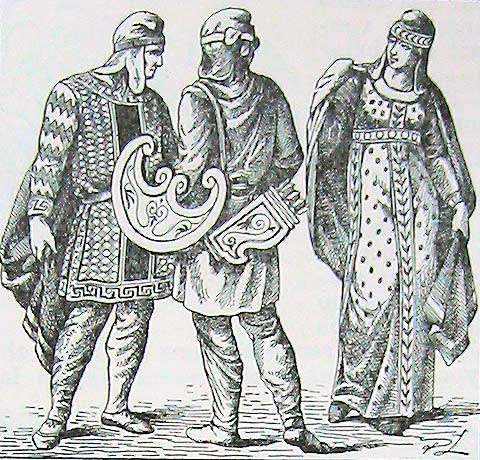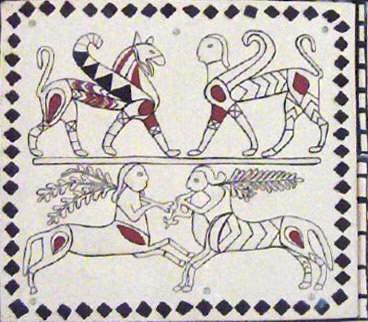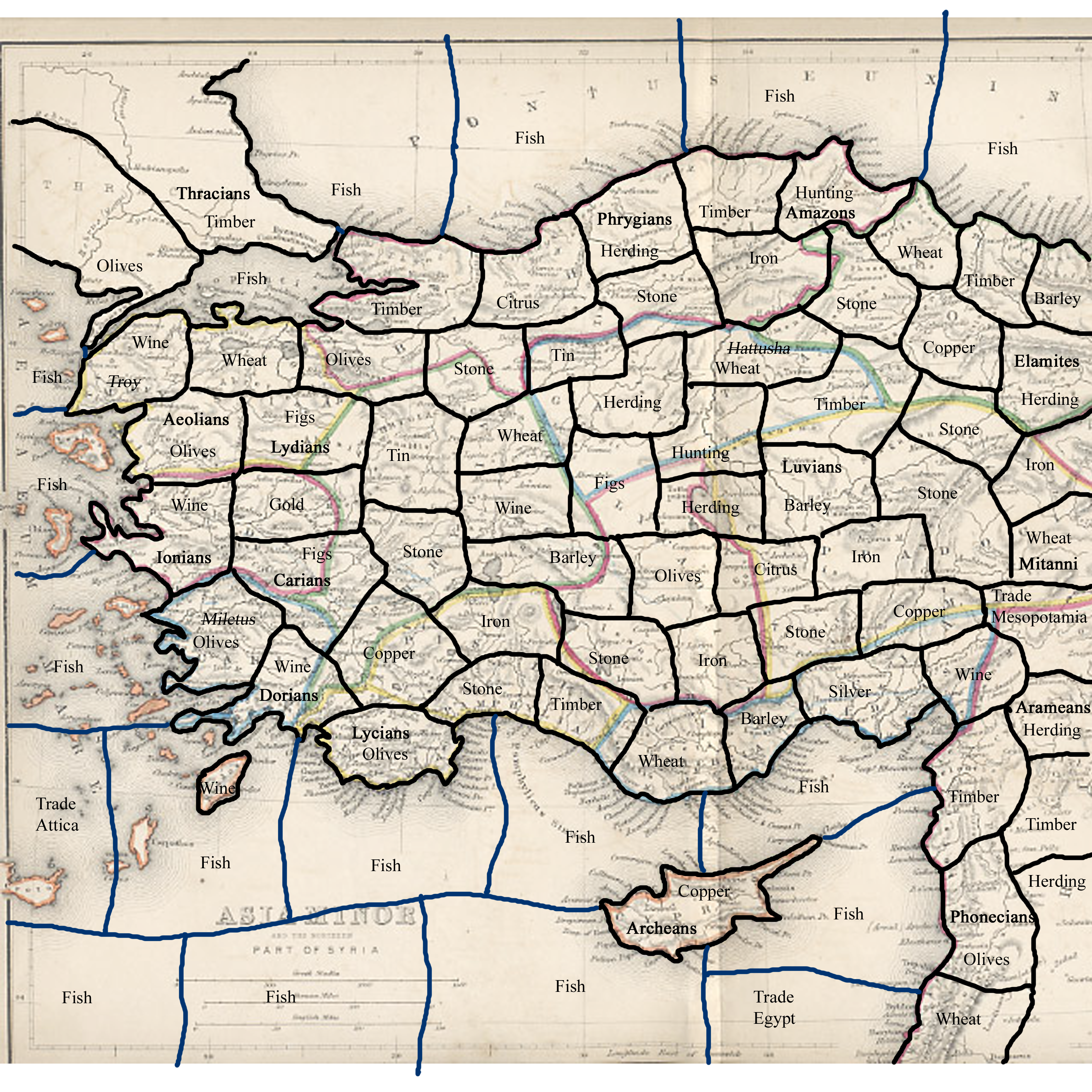ANATOLIA 1000 BC

INTRODUCTION
War game for 2-6 players.
Each player controls a civilization in the area of Asia Minor circa 1000 BCE.
Each turn represents 10 years.
COMPONENTS
Map (see bottom of page)
Player Counters
Player Mats
Victory Track
Dice
THE MAP
The map is divided up into numerous regions.
Note that regions are also referred to as territories, and spaces.
Each region provides a specific resource.
Some regions are the starting locations of Civilizations (Boldface).
Some regions start with a City (Italics and Strikethrough).
Fish regions are Sea Regions.
The Egypt and Attica Trade spaces are Sea Regions.
The Island of Rhodes is a land Region completely enclosed by a Sea Region.
PLAYER COUNTERS
Note that the term Markers, Tokens, and Counters are interchangeable.
Each player has a set of counters of a unique color.
Counters are used on the map to indicate control of regions and
placement of cities.
Counters on player mats are used to keep track of resources.
NEUTRAL MARKERS
These are used to indicate a space is controlled by a non-player civilization/tribe.
Use white, black, or grey colors for neutral counters.
PLAYER MATS
Each player gets a player Mat.
A Mat is divided into 14 Sections.
Sections are also referred to as Boxes or Spaces.
The Sections are labeled:
1. Population
2. Armies
3. Fleets
4. Ideas
5. Metal
6. Stone
7. Wood
8. Grain
9. Wine
10. Fish
11. Fruit
12. Olives
13. Livestock
14. Monuments
Each section is large enough to make a stack of player counters.
Mats are used to keep track how many of each resource a player has.
VICTORY
The first player to accumulate 100+ Victory Points (VP) wins.
If the Knowledge deck ever runs out, the game immediately ends and
the player with the most VP wins.
VICTORY TRACK
This is a winding track of 100 numbered spaces.
Each player uses a marker to keep track of how many VP they have.
DECKS
There are 2 Decks:
The Event Deck
The Knowledge Deck
THE KNOWLEDGE DECK
The top 4 cards of the Knowledge deck are always kept face up.
There are several types of Resource Cards:
Continuous cards, Bonus cards, Advantage cards.
Continuous Knowledge cards provide a 1 specific
Resource Point every turn in Resource Phase.
Bonus cards provide a one time bonus of 1 or more Resources.
Advantage cards provide a continuous bonus to warfare or some other aspect of play.
DICE
Six and Ten sided dice are used.
SETUP
Each player gets a set of counters of a unique color.
Each player picks one civilization to control.
Players place one marker on the map on the starting space of that civilization.
Players cannot pick a civilization adjacent to Civ picked by another player.
Players roll high on 1D10 to see who goes first. Play proceeds clockwise.
Each player starts with 2 Surplus Populations.
Each player starts with 2 Armies and/or Fleets.
(Fleets may only be picked if the Civ is adjacent to a water region)
Each player rolls 10 times on the Random Resource Table.
Each roll gives one unit of the indicated Resource.
Place a neutral marker in every space not controlled by a player.
Place 2 neutral markers in every City start space.
RANDOM RESOURCE TABLE
1D10 Resource:
1 Fruit
2 Olives
3 Livestock
4 Gold
5 Metal
6 Stone
7 Timber
8 Grain
9 Wine
0 Fish
TURN SEQUENCE
Players take turns.
Each turn has 9 Phases:
1. Resource Phase
2. Trade Phase
3. Event Phase
4. Upkeep Phase
5. Knowledge Phase
6. Build Phase
7. Recruit Phase
8. Conquest Phase
9. End Phase
RESOURCE PHASE
Gain 1 Resource from each of your Territories.
Place a counter on the appropriate box of the player mat.
Copper, Iron, and Tin all count as Metals.
Trade spaces provide Gold.
Gold and Silver spaces count as Gold.
Citrus and Figs count as Fruits.
Wheat and Barley count as Grain.
Hunting and Herding count as Livestock.
Each City provides 1 Gold and 1 Victory Point.
Each Monument provides 1 Victory Point.
Continuous Knowledge cards provide a 1 specific
Resource Point every turn in Resource Phase.
THE GOLDEN RULE
At any time you may convert 2 Gold into 1 Resource of any type.
Likewise, at any time you may convert 2 Resources of the same type into 1 Gold.
TRADE PHASE
You may trade resources with your opponents.
EVENT PHASE
Roll 1D6.
On a roll of 4-6 draw 1 card from the Event Deck.
If the event deck ever runs out, shuffle the discard and draw from it.
UPKEEP PHASE
Cities, Armies, Fleets, and Surplus Population have an upkeep cost
of 1 Food of any type.
If this cannot be paid, remove the unsupported unit from play.
Ignore upkeep phase on your first turn of the game.
KNOWLEDGE PHASE
Roll once on the Idea Table.
Possession of Advance Knowledge cards with the Discovery Trait allow 1 extra roll each.
The top 4 cards of the Knowledge deck are always kept face up.
You may buy one or more of the top 4 cards of the Knowledge deck.
Their cost is in Idea Points.
Bonus cards provide their one time bonus of 1 or more Resources immediately.
Place your Knowledge cards face up next to you on the table.
THE IDEA TABLE
1D10 Result
1-4 Nothing
5-9 Gain 1 Idea Point
10+ Gain 2 Idea Points
Record Idea Points on your Player Mat.
BUILD PHASE
You may build 1 or more cities and 1 or more monuments.
A City costs 2 Stone, 2 Wood, and 2 Surplus Population.
A Monument costs 5 Stone and 1 Surplus Population.
A Monument gives an immediate bonus of 10 VP.
To signify that you have built a city, place a marker onto the map onto a land region
where you already have 1 or markers.
To signify that you have built a monument, place a marker onto your player map on
the monument space.
A Land Region may contain a maximum of 5 cities.
Sea Regions may not contain cities.
RECRUIT PHASE
You may recruit 1 or more Surplus Populations, Armies and/or Fleets.
A Surplus population costs 3 units of Food of different types.
An Army costs 3 Metal and 1 Surplus Population.
A Fleet costs 3 Wood and 1 Surplus Population.
CONQUEST PHASE
You may attack target adjacent land regions with your Armies.
You may attack target adjacent sea regions with your Fleets.
A unit may keep attacking until it is destroyed or the player decides to stop.
For each attack, roll once on the Conquest Table.
Advance Knowledge cards with the Warfare trait give you +1 to your roll on the Conquest Table.
Likewise, facing opponents with Warfare bonuses give you -1 to your rolls.
Some Event cards will give a Modifier to your roll on the Conquest Table.
Get a -1 to the Conquest roll for each city in the target Region.
Get +1 to the Conquest roll if you have twice as many or more armies as the defending Civilization.
Get +1 to the Conquest roll if the defender is a Neutral Civilization.
Get -1 to the Conquest roll if you have twice as few or less armies as the defending Civilization.
Get a -1 to the Conquest roll if the Region produces Stone or Metal.
If you conquer a region controlled by another player, he may prevent the conquest by
sacrificing one of his armies (land region only) or fleets (sea region only).
When you conquer a Region, if there are 1 or more cities there, discard 1 city and
gain 2D6 Gold (Pillage Rule).
When you conquer a Region, replace all the markers on it with markers of your own color.
Allies Rule: Players may lend each other Armies and Fleets (to the attacker or Defender).
THE CONQUEST TABLE
1D10 Result:
1-4 The Attacking Unit is Destroyed
5-6 The Attacking Unit is Destroyed and The Target Region is Conquered
7-10+ The Target Region is Conquered
END PHASE
Resources in excess of your stockpile limit are discarded in end phase.
STOCKPILE LIMIT
Except for gold, the most Resources you can keep of a single type is 8.
The Limit for Gold is 24.
Excess Resources are discarded in end phase.
Some Advance Knowledge cards will give a bonus to your Stockpile Limit.
TRIBUTE RULES
Before attacking an opponent, you may demand Tribute as payment to not attack.
PEACE CARDS
When you buy a Peace card, pick a target opponent.
Neither of you may attack each others Regions or ally against each other for
each of your next 3 turns.
RESURGENCE RULES
If your civilization is completely conquered, you may keep your VP and restart as a
new Civilization. Pick from any available neutral civilizations first. If none are available,
pick any Civ that is not the identity of an opposing player.
Start in control of the chosen Civs start space with resources and units as described in
the setup rules.
You may also at the beginning of your turn give up on your current Civ and pick a new
one; all the territories of the old one become neutral.
KNOWLEDGE DECK CARD LIST NOTATION
A = Advance card
B = Bonus card
C = Continuous card
P = Peace card
KNOWLEDGE DECK CARD LIST
Card Name: Cost Type Notes
King Midas 4 B Gain 12 Gold
Migration 5 B Gain control of 2 adjacent neutral territories
Allies 3 B Gain 1 Army
City State 5 B Gain 1 City and 2 VP
Found Town 4 B Gain 1 City
Coinage 3 B Gain 9 Gold
Dynasty 3 B Gain 2 VP and 6 Gold
Alphabet 3 B Gain 6 VP
King Gordias 3 B Gain 3 VP and 3 Stone
Mythology 5 B Gain 10 VP
Architecture 5 C Gain 1 VP in Resource Phase
King Tantalus 4 B Gain 4 VP and 6 Gold
Bronze Age 2 B Gain 4 Metal
Iron Working 3 B Gain 6 Metal
Double Headed Axe 3 B Gain 3 VP and 3 Metal
Paganism 2 B Gain 4 VP
Worship of Cybele 4 B Gain 4 VP and 1 Surplus Population
Polytheism 4 B Gain 8 VP
Music Traditions 3 B Gain 6 VP
Religious Cults 3 B Gain 2 VP and 1 Surplus Population
Famous Archers 5 C Warfare +1
Distinctive Costumes 4 B Gain 1 VP per Region you control
Electrum 2 B Gain 6 Gold
Trade Routes 3 B Gain 2 Gold per City you control
Maritime Power 3 B Gain 1 Fleet
Slaves 2 B Gain 2 Grain and 2 Stone
Mausoleum 6 B Gain 1 Monument
Engineering 3 C Gain 1 Stone in Resource Phase
Viticulture 3 C Gain 1 Wine in Resource Phase
Mining Techniques 3 C Gain 1 Metal in Resource Phase
Monolithic Sculpture 3 B Gain 2 VP and 4 Stone
Swift Horses 4 A Land Warfare +1
Many Fortresses 3 A Land Warfare Defense +1
Famous Hunters 3 C Livestock +1
Fierce Warriors 5 A Warfare +1
Unique Pottery Style 4 CB Stockpiles +1 and 3 Wine
Art 5 AB Discovery and 2 VP
Philosophy 4 A Discovery
Science 5 AB Discover and 2 Metal
Irrigation 3 C Gain 1 Grain in Resource Phase
Agriculture 3 B Gain 3 Grain and 3 Olives
Legal System 4 CB Stockpiles +1 and 2 VP
Suzerainty 3 B Gain control of 1 Adjacent Territory
Seamanship 3 C Gain 1 Fish in Resource Phase
Treaty 2 P Peace Gain 2 VP
Diplomacy 2 P Peace Gain 2 VP
Superior Organization 5 A Warfare +1
Craftsmen 3 C Gain 1 Gold in Resource Phase
Chariots 4 A Land Warfare +1
Citadels 3 A Land Warfare Defense +1
Royal Road 3 B Gain 3 VP for every City you control
Colony 3 B Gain control of 1 non-adjacent neutral Region
Orchards 3 B Gain 3 Fruit and 3 Olives
Aegean Trade 5 C Gain 1 Random Resource in Resource Phase
EVENT DECK
Card Name: Notes
Famine Lose 1 Surplus Population
Plague Lose 1 Surplus Population
Storm Lose 1 Fleet
Drought Lose all your Grain
Blight Lose all your Fruit
Disease Lose 1 Army
Pestilence Lose all your Livestock
Corruption Lose 2D6 Gold
Dark Ages Lose 2 Idea Points
Golden Age Gain 1 extra Phase of your choice this turn
Progress Gain 1 Idea Point
Prosperity Gain 5 Gold
Immigrants Gain 1 Surplus Population
Refugees Gain 1 Surplus Population
Earthquake Lose 1 Monument
Ruins Lose 1 City
Fire Lose all your Wood
Great King Gain Warfare +1 this Turn
Rebellion One of your territories becomes Neutral
Revolt One of your territories becomes Neutral
Mined Out One of your Metal Regions no longer produces
Trade Gain 5 Gold
Dissemination Gain 1 Idea Point
Conquest Gain Warfare +1 this Turn
Raids Steal 2 Resources from target Opponent
Epidemic Lose 1 Surplus Population
Civil War Lose 1 Army
Weak King Suffer Warfare -1 until end of your next turn
Annexation Gain control of 1 adjacent Region
Conversion Gain control of 1 adjacent Region
Piracy Lose 2D6 Gold
Vitality Gain 1 extra Phase of your choice this turn
Legendary King Gain 1 extra Phase of your choice this turn
Population Explosion Gain 1 Surplus Population
Prophecy Look at next 7 cards of either deck
Forgotten Lore Lose 1 Continuous or Advance Knowledge card
OPTIONAL RULES
Strong Starts: At the start of the game, each player begins in control of all the
adjacent regions surrounding their start space.
Cimmerian Late Start: If the game goes 20 or more turns, a player may pick per
the Resurgence rules to restart as the Cimmerians. The Cimmerians Start space is the
region immediately above the Elamite Start space. The Cimmerians start with 6 Armies.
Knowledge Starts: Certain Civs Start with 1 Specific Knowledge card:
Ionians - Philosophy
Arameans - Swift Horses
Dorians - Aegean Trade
Archeans - Maritime Power
Phrygians - Famous Archers
Lydians - Currency
Phoenicians - Colony
Luvians - Iron Working
Amazons - Famous Hunters
LINKS
Phrygia Wikipedia




Return to Warpspawn Mainpage
�






